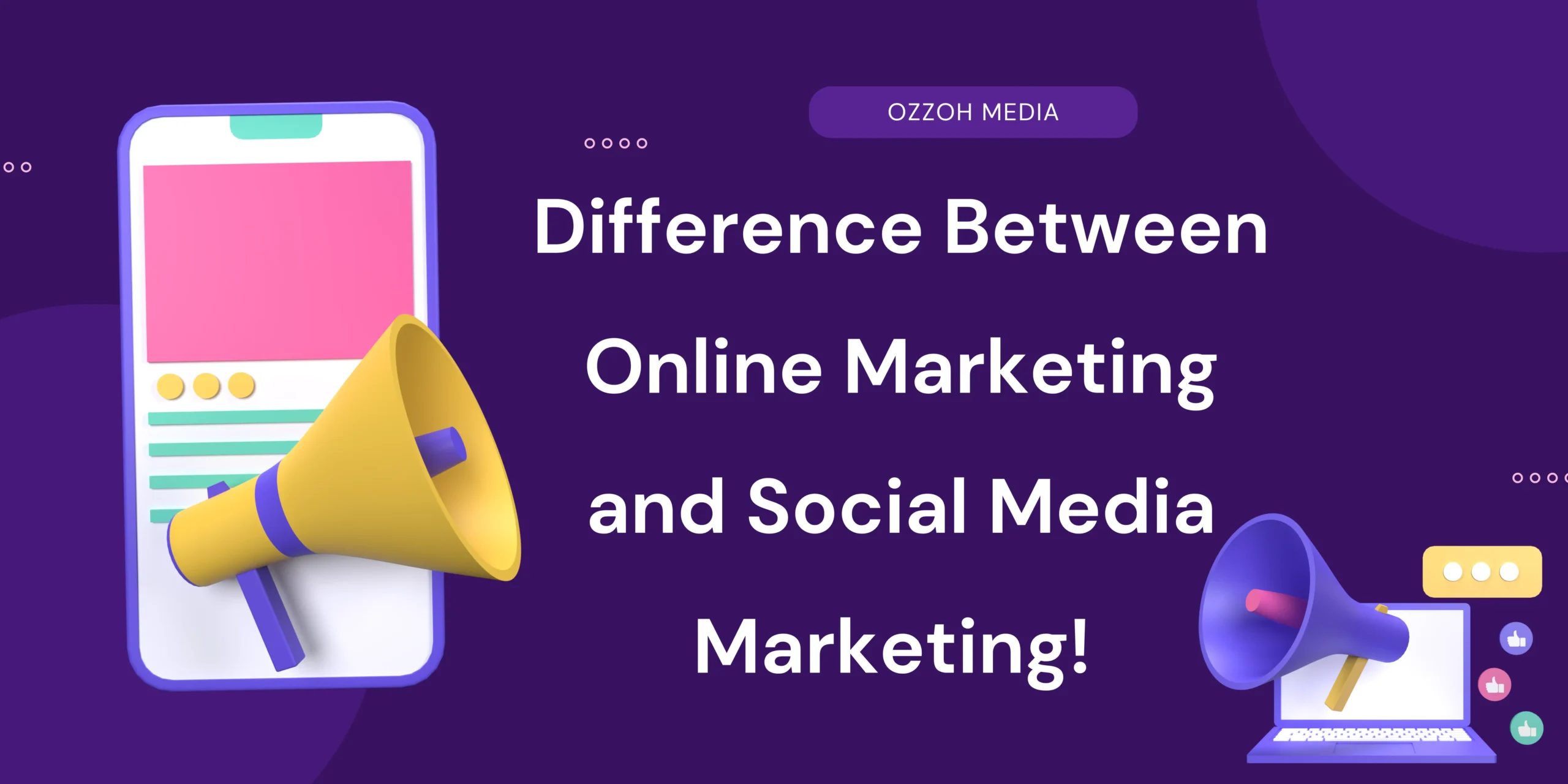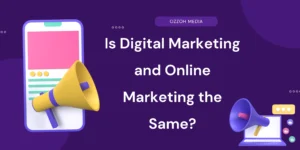In the ever-evolving world of digital marketing, businesses have a variety of tools and strategies at their disposal to reach their target audiences. Two of the most frequently used terms are online marketing and social media marketing. While these terms may seem similar, they refer to distinct marketing approaches. In this article, we’ll dive into the difference between online marketing and social media marketing, helping you understand which strategy suits your business needs best.
What is Online Marketing?
Online marketing, also known as internet marketing, refers to all marketing activities conducted over the internet. It encompasses a wide range of strategies and channels, all of which require an internet connection to function. Some of the main online marketing methods include:
- Search Engine Optimization (SEO): The process of optimizing your website to rank higher in search engine results, increasing organic traffic.
- Pay-Per-Click (PPC) Advertising: Paid ads that appear on search engines, websites, and social media platforms.
- Email Marketing: Sending promotional emails to a targeted audience to build relationships and promote products or services.
- Content Marketing: Creating and distributing valuable content (blogs, videos, infographics) to attract and engage an audience.
- Affiliate Marketing: Partnering with affiliates who promote your products or services in exchange for a commission.
Online marketing encompasses all of these tactics, with the goal of reaching potential customers wherever they are online.
What is Social Media Marketing?
Social media marketing is a specific subset of online marketing that focuses solely on promoting products, services, or content through social media platforms. These platforms include popular networks such as:
- Twitter (X)
- TikTok
Social media marketing involves creating engaging content tailored to the unique audience of each platform, whether it’s posts, stories, videos, or ads. The goal of social media marketing is to build brand awareness, engage with followers, drive website traffic, and ultimately, increase sales or conversions.
Key Differences Between Online Marketing and Social Media Marketing
1. Scope
The main difference between online marketing and social media marketing lies in their scope. Online marketing covers all marketing efforts that take place on the internet, from search engines to emails to display ads. Social media marketing, on the other hand, is limited to social media platforms, focusing on building communities and engaging users within those spaces.
In essence, all social media marketing is online marketing, but not all online marketing is social media marketing. Social media is just one of many channels used in an online marketing strategy.
2. Marketing Channels
Online marketing uses a diverse array of channels to reach potential customers, including:
- Websites and blogs (for SEO and content marketing)
- Search engines (for PPC advertising and organic search)
- Email platforms (for email marketing)
- Third-party websites (for affiliate marketing and display ads)
Social media marketing exclusively uses social platforms to engage and communicate with customers. This includes organic social posts, paid social ads, influencer collaborations, and interactive content like polls and stories. While online marketing can encompass social media, it relies on a much broader range of channels.
3. Purpose and Goals
Both online marketing and social media marketing aim to promote businesses and drive traffic, but their goals can vary slightly.
Online marketing focuses on overall digital presence. This may include increasing website traffic, improving search engine rankings, growing email lists, or driving direct sales through e-commerce platforms. Online marketing is often seen as a comprehensive approach that includes long-term strategies like SEO and content marketing, as well as short-term tactics like paid advertising.
Social media marketing, on the other hand, emphasizes audience engagement and brand-building. It involves interacting with followers, creating shareable content, and nurturing a sense of community. While social media marketing can also drive sales, it typically works as a top-of-the-funnel activity aimed at raising brand awareness and building customer relationships.
4. Targeting and Audience Reach
Online marketing allows businesses to reach users across multiple touchpoints. Through SEO, PPC ads, and email campaigns, companies can target specific audiences based on keywords, behaviors, demographics, and even geographic locations. Online marketing tools like Google Ads and email automation systems offer advanced targeting options, ensuring businesses reach the right people at the right time.
Social media marketing also provides robust targeting capabilities, especially through paid ads. Social platforms allow businesses to target audiences based on their interests, demographics, and online behaviors. However, social media marketing generally focuses more on organic growth through engagement, relying on shares, likes, comments, and user-generated content to spread the word. The reach of social media marketing depends largely on a brand’s ability to engage its followers and build a loyal community.
5. Interaction with Customers
One of the key distinctions between social media marketing and other forms of online marketing is the level of interaction with customers. Social media marketing is highly interactive, encouraging two-way communication. Businesses can respond to comments, participate in conversations, and even engage with customer feedback directly. This real-time engagement helps build trust and a more personal connection with the audience.
Online marketing, while still interactive, doesn’t always offer the same immediate feedback loop. SEO, PPC, and email marketing are more focused on driving traffic or conversions, with less emphasis on direct conversations with customers. However, these channels often lead users to a website or landing page where they can engage further.
Which One is Right for Your Business?
Deciding between online marketing and social media marketing depends on your business goals. If you’re looking for a comprehensive digital strategy that includes multiple channels, such as SEO, PPC, and email, then online marketing is the way to go. It provides a broader scope and allows you to reach potential customers across various platforms.
If your goal is to build a brand presence, foster community engagement, and connect directly with your audience, social media marketing can be more effective. For businesses that rely heavily on customer relationships and user-generated content, social media is a powerful tool for growth.
Many businesses find success by combining both online and social media marketing strategies to create a balanced and effective digital marketing approach.
Conclusion
While online marketing and social media marketing share similarities, they differ in scope, channels, goals, and customer interaction. Online marketing is a broader term that covers all internet-based marketing activities, while social media marketing focuses specifically on using social networks to engage with customers and build brand awareness.
Understanding the difference between online marketing and social media marketing can help businesses develop more effective marketing strategies and make the most of their digital presence.




